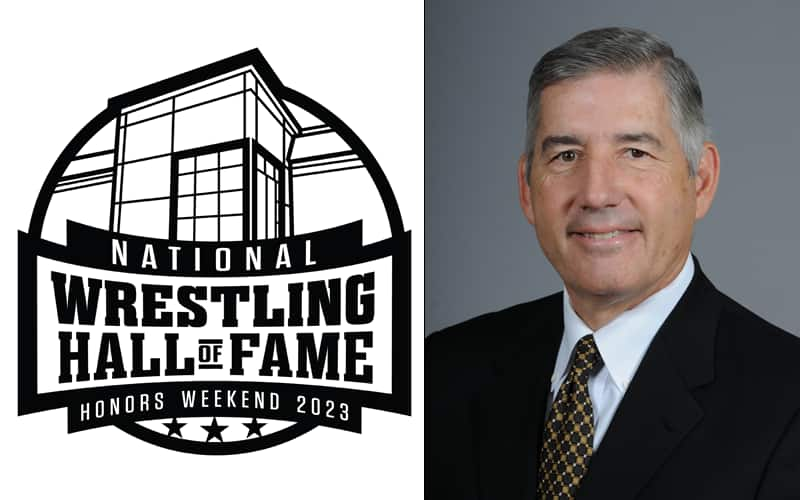
Outstanding American — Bob Bowlsby
Share:
by National Wrestling Hall of Fame

Bob Bowlsby wrestled at Waterloo West High School for legendary Hall of Fame coach Bob Siddens and at Minnesota State University Moorhead, where he was team captain and Northern Sun Intercollegiate Conference champion.
A lifelong advocate for wrestling, Bowlsby served as the Chair of the NCAA Wrestling Committee and the National Wrestling Hall of Fame Dan Gable Museum’s Glen Brand Wrestling Hall of Fame of Iowa’s Bowlsby Family Legacy Award is named in honor of his family. His brother John was an Iowa state high school champion and a three-time All-American and two-time Big Ten Conference champion for the University of Iowa while parents, Bob and Pat, and sisters, Ann, Sarah and Jane, were instrumental in their careers.
Throughout his career Bowlsby used his wrestling background, skill, expertise and leadership to help the programs he has overseen achieve growth and financial success.
He retired in 2022 after 10 years as commissioner of the Big 12 Conference.
As has been the model at each stop in his career, complete program growth, financial success and personal accomplishments have been the by-product of Bob’s skill, expertise, and leadership.
Under his leadership, the Big 12 won 32 national team championships, including an all-time high eight national titles in 2021-22, and 175 NCAA individual event crowns.
Thirty-two additional Big 12 teams finished as runners-up in NCAA competition.
Bowlsby oversaw several major changes in Big 12 membership, including the addition of Texas Christian University and West Virginia University, replacing departures by Colorado, Missouri, Nebraska and Texas A&M.
Most recently he guided the addition of future members Brigham Young, Central Florida, Cincinnati and Houston, following the departure of the University of Oklahoma and the University of Texas.
In his tenure with the Big 12, Bowlsby finalized one of the most lucrative television deals in college athletics and oversaw the expansion of the existing ESPN rights agreement with the 2019 debut of Big 12 Now on ESPN+.
Hundreds of additional Big 12 sports events and original programming are distributed annually on the digital platform, including wrestling.
Bowlsby played a key role in the formation of the College Football Playoff that began in 2014-15, the first postseason playoff in the history of the sport.
Prior to his role at the Big 12, Bowlsby spent six years directing a Stanford University athletics department that sponsors 35 varsity sports and claimed an unprecedented 17 consecutive Learfield Sports Directors Cups, emblematic of the top overall athletics program in the country.
Bowlsby arrived at Stanford after a 15-year stint as the director of athletics for the University of Iowa. In his final four years, he guided and supervised the merger of the Hawkeye men’s and women’s athletic departments that included 24 varsity sports.
Before his stint overseeing the Hawkeye athletic department he served in the same role for seven years at the University of Northern Iowa, beginning in 1984 after serving as the assistant athletic director for facilities.
A national leader in intercollegiate and amateur athletics, Bowlsby served on the United States Olympic Committee from 2007 to 2014 and also for two years in the 1990s. He was named National Athletics Director of the Year in 2004 and served as a member of the Commission on Opportunities in Athletics.
He served as president of the NCAA Division I-A Athletics Directors’ Association, chair of the NCAA Division I Men’s Basketball Committee and chaired the NCAA Management Council.
He has also served on NCAA committees on Financial Aid and Amateurism, the Special Committee to Review Amateurism Issues and the Special Committee to Review Financial Conditions in Athletics.
In 2013, he was named to the NCAA 40th Anniversary Tribute Team, which recognized the 40th anniversary of NCAA Division II competition, and received the MSU Moorhead Alumni Achievement Award. He was inducted into the Dragon Sports Hall of Fame in 1998 and the University of Northern Iowa Hall of Fame in 2007.
He received his bachelor’s degree from MSU Moorhead in 1975 and his master’s degree from the University of Iowa.